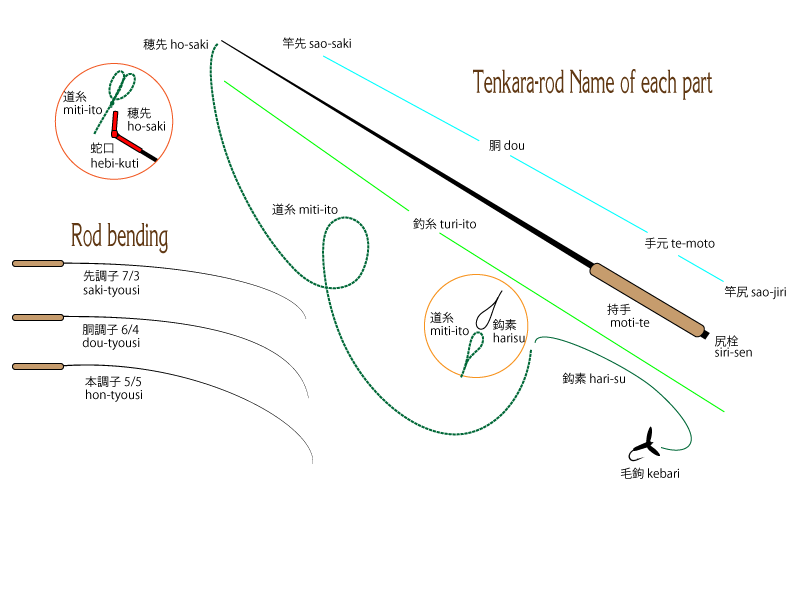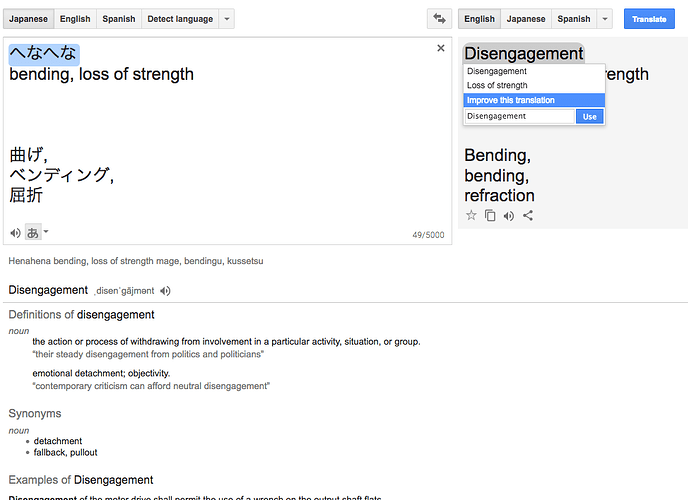Can someone explain the meaning of : ビシッ[Bishi~tsu or “Bishishi” ?] and ヘナヘナ [henahena] ?
ヘナヘナ - seems to mean a kind of sine wave shape of the line during casting, due to lack of energy going into the line during casting. The meaning or translation of ビシッ thus far remains a mystery.
Example sentence:
" ポイントに毛鉤を“ビシッ”と撃ち込むのが好みだが、
ラインは勢いを失ってヘナヘナと着水する。"
From this website:
シマノ「メイストーンNW 36」レビュー ~初日で折りました~
Shimano “Maystone NW 36” review - folded(??) on the first day -
https://tknc.jp/tp_detail.php?id=263
Where the meaning / proper translation of 「ビョーンビョーン」`Byōnbyōn’, and 「軽いッ」karui ~tsu’, light or mild, I think, remains elusive.
As in the sentences:
“ビョーンビョーンという感触が、過去に振ったどのテンカラロッドとも違う。”
And
“最初のポイントを狙い竿を振る、「軽いッ」。”
–::–::–
Oddly in the following sentence, from a different website ,- ヘナヘナ (henahena) digitally translates as “loss of strength”. The meaning of ナンダカ (nandaka) is also difficult to determine:
“どうしてラインは途中でヘナヘナとなるんだろう。
ラインが勝手になるハズも無く、とすると原因は竿なのか?
ヘナヘナ落下はラインを引く穂先の動きに原因が有るのかも。
しつっこく観察しているとナンダカが見えてきました。”
From this blog post:
テンカラ竿の穂先を切り詰める – Trim /Shorten the tip of the tenkara pole
tenkarapass テンカラ竿の穂先を切り詰める
Wherein this line ラインをもヘナヘナ波形 - will digitally translate as either - Hena henna waveform also on the line - or as - Loss of strength waveform also the line.
Just a bit of trivia about the proper meaning of strange Japanese words that do not easily translate into English.
Often I find when words are doubled they either mean a repeating sound word, like chugachuga in English or チョンチョン, chonchon in Japanese, sometimes used to describe the repeating movement of sasoi (誘い).
Or the double word will just mean more of something. Such as mukashi (昔) = old days. But mukashimukashi (昔昔 or 昔々) is “long ago” or “once upon a time” aka long long ago. 
The same mystery words appear in many websites. Usually dealing with descriptions of proper casting. Here’s another
From Eddie Yamakawa’s blog – 私の釣り方 , My way of fishing:
http://www.eonet.ne.jp/~tenkara/page010.html
“… 空中で伸びきったラインがそこからヘナヘナと落下することになってしまいます。” = The line that has grown in the air will fall from there with hennahena. Or = It would end up with the line fully extended in the air to fall with the loss of strength from there. Thus henahena seems to be a line shape that indicates low energy. May like a wet noodle looks different from an uncooked noodle.
The Dutch have a word that translates as “soft boiled egg” When used to describe a person it means someone lacking a backbone or lacking courage. Words are funny and fascinating things. 
And I recall seeing the word “ビシッ” , “bishi~tsu” or “bishishi” on tenkara fishing websites before. But never put much effort into discovering the meaning. Or if I did I have forgotten it.
Thanks in advance. I am sure someone can do a proper translation. These are words, fishing terms or usage of the words related to fishing, one never finds discussed in language books.
![]()

